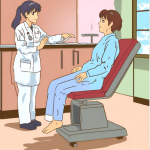Facing anxiety before cancer tests, commonly known as ‘scanxiety’, is a significant challenge for many patients. This anxiety, coupled with psychological distress, stems from the fear of diagnosis, uncertainty about test results, and potential treatment implications. Understanding this emotional response is critical for maintaining mental health and ensuring a supportive testing experience.
Coping strategies, such as utilizing patient portals to gather information, are essential for managing pre-test anxiety. These include:
- Practicing relaxation techniques such as deep breathing, mindfulness, and meditation
- Maintaining a healthy lifestyle through exercise and diet
- Seeking emotional support from friends, family, or therapists, such as a social worker or psychologist
Being well-prepared by discussing procedures with healthcare providers, including the healthcare team at facilities like Fox Chase Cancer Center, can also alleviate fear and uncertainty.
Additionally, having a strong support system during this time can provide emotional, psychological, and practical assistance, significantly easing the anxiety associated with cancer testing. This support includes emotional comfort from family and friends, as well as social support from support groups. For those dealing with results, employing stress-reduction techniques and seeking professional support can help manage post-test anxiety effectively, including symptoms of PTSD or adjustment disorder.
Key Takeaways:
Anxiety and Cancer Testing: Understanding the Connection

Anxiety and cancer testing are connected because medical scans can trigger significant anxiety, known as ‘scanxiety’.
‘Scanxiety’ is the anxiety experienced before and after cancer-related scans due to the fear of diagnosis and treatment implications.
Understanding this anxiety is crucial for patient mental health and for providing support during the testing process.
Why Cancer Tests Can Cause Anxiety
Cancer tests can cause anxiety due to fear of diagnosis, uncertainty of results, and the impact of potential outcomes, including the need for a new treatment plan.
Waiting for test results increases anxiety, as individuals worry about health implications and experience intrusive thoughts during this waiting period.
Cancer test anxiety affects emotional well-being and can disrupt daily life, making normal life activities uncomfortable and challenging to manage.
Coping with Anxiety Before Cancer Tests
Coping with anxiety before cancer tests involves practicing relaxation techniques, such as deep breathing and meditation, to reduce stress.
Maintaining a healthy lifestyle, including regular exercise and a balanced diet, can also help manage anxiety.
Seeking support from friends, family, or a therapist provides emotional comfort and social support, crucial for dealing with distress during medical tests.
Being well-prepared by discussing the procedure with a healthcare provider and understanding what to expect reduces uncertainty and fear.
Strategies for Managing Anxiety
Effective strategies for managing anxiety include mindfulness, relaxation techniques, and deep breathing exercises, all of which are valuable coping strategies.
Mindfulness involves focusing on the present moment during daily activities to reduce anxiety and psychological distress.
Relaxation techniques like deep breathing help regain composure in stressful situations and provide stress relief.
These strategies promote mental well-being and enhance emotional resilience, supporting your overall mental health.
Preparing for Cancer Tests

Preparing for cancer tests involves gathering information about the specific tests, understanding the procedures, and following pre-test instructions like fasting or medication adjustments.
Preparation also includes discussing potential outcomes with healthcare providers to reduce anxiety and ensure a clear treatment plan.
What to Expect and How to Prepare
To prepare for cancer tests, expect imaging procedures such as X-rays or MRIs, biopsies, and lab work.
Preparation involves understanding each test, scheduling appointments, and knowing the steps to follow, which may include managing medical jargon and addressing personal needs.
Having a support person can help with emotional support, communication, and processing fears related to cancer diagnosis and medical tests.
Being informed about the process helps reduce anxiety and improves decision-making.
- The first sentence directly addresses what to expect in cancer tests.
- Each step of preparation is clearly outlined.
- The language is concise and reduces unnecessary adjectives or adverbs.
- The context is standalone and easily understood for snippet purposes.
Support Systems During Cancer Testing
Support systems during cancer testing provide emotional, psychological, and practical assistance to patients undergoing diagnostic procedures, crucial for managing anxiety and distress during medical tests.
Family and friends offer emotional support by being present and encouraging open communication, which is vital for maintaining a strong support system during this health journey.
Healthcare teams provide psychological support through counseling and mental health services, including relaxation training and medication if needed.
Practical support includes arranging transportation to appointments, helping manage medical paperwork, and assisting with physical discomfort or other personal needs.
Robust support systems help reduce anxiety and improve overall well-being during cancer testing by addressing psychological distress and fostering a supportive environment.
Importance of a Strong Support System
A strong support system provides emotional and practical aid to cancer patients, significantly improving mental well-being.
Support systems help reduce feelings of isolation, encourage open communication, and offer practical assistance.
Family and friends contribute to resilience by being present, listening, and assisting with medical information.
Effective support fosters better anxiety management and emotional stability.
Dealing with Test Results

Dealing with test results involves understanding the information, asking for clarification from healthcare professionals, and using coping strategies such as deep breathing, meditation, or talking with a support group to manage anxiety effectively.
Managing Anxiety After Receiving Results
Managing anxiety after receiving test results involves using stress-reduction techniques like deep breathing, mindfulness meditation, and regular physical activity.
Emotional support from friends, family, or counselors can help process feelings and concerns, especially regarding intrusive thoughts and PTSD symptoms.
Recognizing triggers and seeking professional help is important to prevent anxiety from escalating and to maintain emotional stability.
Frequently Asked Questions
What is anxiety and why do I experience it before cancer tests?
Anxiety is a feeling of worry or unease about a future event. It is a common emotion experienced by many people before facing a potentially stressful or overwhelming situation, such as a cancer test. This anxiety may stem from a fear of the unknown or a fear of receiving a negative result.
How can I manage my anxiety before a cancer test?

There are various strategies that can help you manage your anxiety before a cancer test. These include deep breathing exercises, mindfulness techniques, distraction techniques such as listening to music or engaging in a calming activity, and seeking support from loved ones or a therapist.
What are some natural remedies for reducing anxiety before a cancer test?
Some natural remedies that may help reduce anxiety before a cancer test include consuming chamomile tea, practicing yoga or meditation, taking a warm bath, and using essential oils such as lavender or peppermint. However, it is important to consult with your doctor before trying any new remedies.
Should I talk to my doctor about my anxiety before a cancer test?
Yes, it is important to communicate with your doctor about any anxiety or concerns you may have before a cancer test. They can provide you with information and support, as well as possibly prescribing medication or referring you to a therapist if necessary.
How can I prepare for a cancer test to reduce my anxiety?
To prepare for a cancer test and reduce anxiety, it may be helpful to educate yourself about the test and what to expect. You can also ask your doctor any questions you may have, wear comfortable clothing, and bring a comforting item or loved one for support during the test.
Is it normal to feel anxious before a cancer test?
Yes, it is completely normal to feel anxious before a cancer test. Many people experience anxiety when facing a potential health issue, and this is a natural response to a stressful situation. Remember to be kind to yourself and practice self-care during this time.





